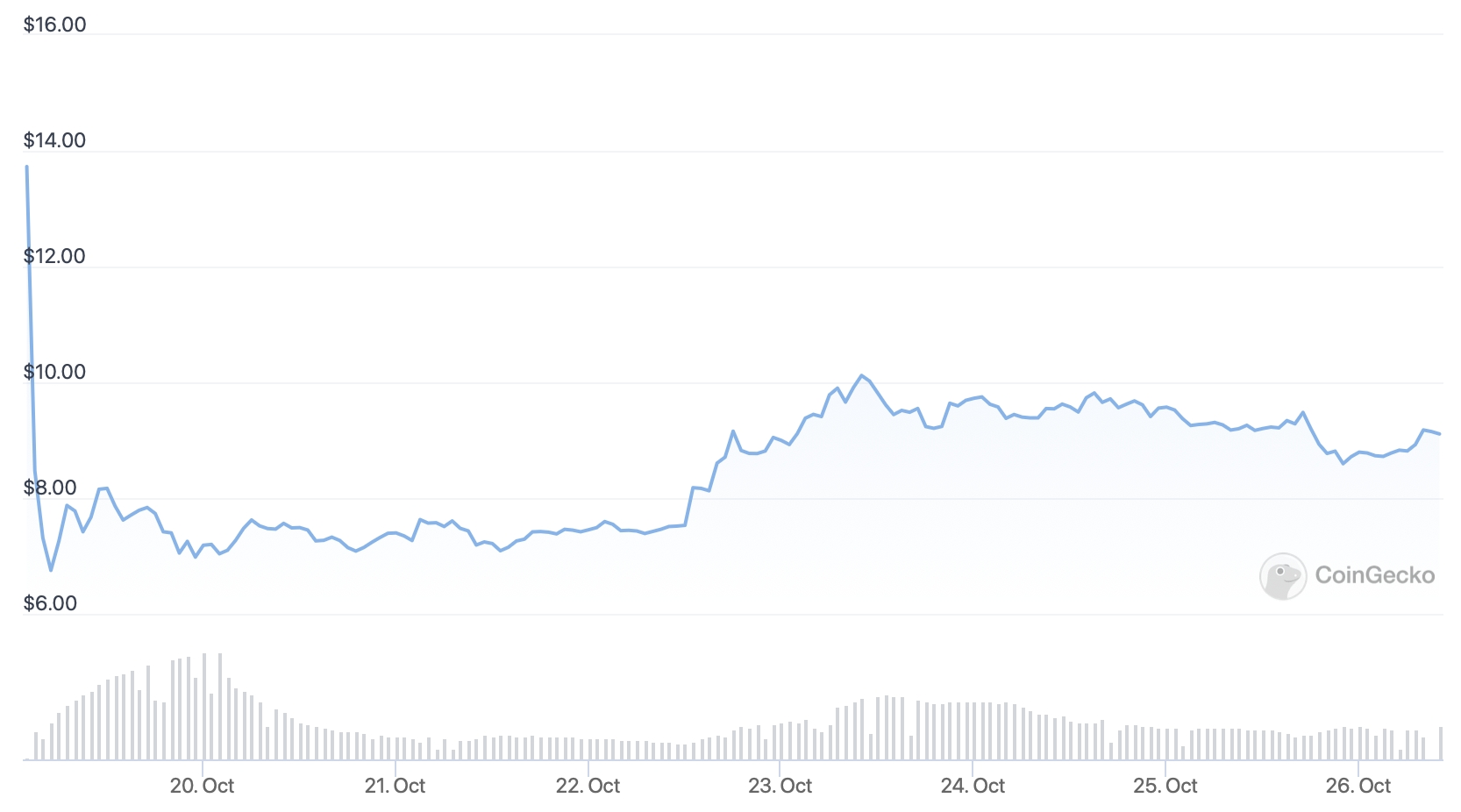
Disclaimer: The Industry Talk section features insights by crypto industry players and is not a part of the editorial content of Cryptonews.com.
The price of Aptos (APT) has fallen by 1% in the past 24 hours, dipping to $9.11. This represents a 33% decline for the new altcoin in the past week, at a time when improved investor sentiment has resulted in gains for the rest of the market.
The wider cryptocurrency market has rallied in the past day, with positive earnings reports and expectations of a more dovish Federal Reserve (vis-à-vis rate hikes) buoying the prices for bitcoin (BTC), ethereum (ETH), Cardano (ADA), and other major coins. However, this uptick in positivity hasn’t been extended to APT, which has failed to build much momentum following its launch, which was undermined by reports of slow transactions and centralized tokenomics.
And given its association with Meta/Facebook, investors may want to look elsewhere for newer altcoins that potentially promise better-than-average gains. Fortunately, there are a variety of fundamentally sound coins that are running their presales right now, all of which hold out hope of big returns for early investors.
Aptos Price Dump Incoming
Aptos’ price chart reveals that, following a big dump upon its launch, it has struggled to recover its former heights. Its record high remains $13.73 (set on October 19), while its current price represents a 33.6% decline relative to this high.

To be fair, if you disregard the dump and focus on the all-time low of $6.73, APT is currently 35% up. Few other coins in the top 100 (by market cap) have recorded a similar gain within the same timeframe.
That said, Aptos remains a controversial cryptocurrency, and for various reasons.
First of all, it was launched with the claim that it could handle over 100,000 transactions per second. In reality, its launch witnessed around four tps, and in recent days it has managed 27 tps, which again is far short of the purported maximum.
At the same time, APT has received criticism for having a highly centralized token distribution. 80% of its total supply of one billion tokens is currently staked, implying that the vast bulk of this supply is going to insiders, rather than the market or wider community of users.
Aptos did release a breakdown of the actual distribution, with 49% going to its core contributors, the Aptos Foundation, and investors (Aptos has received $350 million in VC funding). The remaining 51% has been earmarked for its ‘community,’ but even here, this likely means developers.
As such, Aptos looks like a centralized coin, an impression that is inevitably strengthened by its association with Facebook. Namely, its founders previously worked on the latter’s notorious Libra/Diem project, with its team using the Move language developed for the now-defunct stablecoin.
While such factors may not prove fatal to Aptos, they undermine its credibility to a significant degree. And with the coin already losing momentum so soon after its launch, it remains probable that more dumps are incoming.
3 Low Cap Altcoin Alternatives
While Aptos doesn’t look promising right now, there are a range of other new coins that have the potential to rally and that also don’t have centralization issues.
All three of these projects are already more decentralized than Aptos purely by virtue of holding presales, something which Aptos never did. And while they don’t have the association with a multinational corporation like Facebook (which is as much a curse as a blessing), they each have solid fundamentals, suggesting that they’ll continue to grow once their respective token sales have closed.
One of these is Dash 2 Trade, an Ethereum-based trading intelligence platform that provides investors with real-time analytics, social trading signals, and many other features that will help them make informed decisions. It launched its presale around a week ago and has already raised just over $2.5 million, with its D2T token currently selling at 0.05 USDT.
Another interesting new Ethereum-based platform is IMPT, which is a carbon credit marketplace where consumers can earn tokenized carbon offsets for shopping with green-friendly retailers. So far, its presale has raised over $10 million since beginning at the start of this month.
Thirdly, there’s also Calvaria, which is a play-to-earn video game where players collect and battle with NFT-based cards. One interesting feature of this game is that it’s also open to players who don’t have any cryptocurrency, making it more accessible than the typical blockchain-based game, and possibly setting it up to be a gateway into crypto-based gaming for many players.




